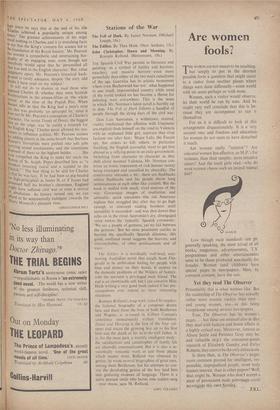Stations of the War
THE Spanish Civil War • persists in literature and painting—as a symbol of futility and heroism, treachery and massive horrors—even more powerfully than either of the two Main cataclysms of the age. Guernica has its artistic monument where even Buchenwald has not: what happened in one small, impoverished country while most of the world looked on has become a theme for indicting wars everywhere. This is the sense in which Mr. Norman's latest novel is harshly up to date. Tlw Fell of Dark follows a handful of people through the dying days of the civil war.
Don Luis Sanroman, a withdrawn, revered, cranky intellectual (his affinities with Unamuno are explicit) finds himself on the road to Valencia with an orphaned little girl, unaware that rival factions are after him: Major Lab, the Fascist spy, has orders to kill; others, in particular Suckling, the English journalist, want to get him abroad as a rallying-point in an exile government.- Switching from character to character as they shift about doomed Valencia, Mr. Norman con- trives an ironic impression of rich human variety being swamped and cancelled by absurdity. The contrivance obtrudes a bit: there are flashbacks within flashbacks and his people throw long reminiscences at each other like confetti. But the book is stuffed with small, vivid stations of the war, Goyaesque images of mutilation and animality, quick anecdotes (the old American biplane that struggled day after day to go high enough to intercept raiding bombers until incredibly it succeeded—and was shot down) that echo on in the mind. Sanroman's dry, disengaged voice makes the 'typically' Spanish comments: 'We are a people of gestures, yet we fail between the gestures.' But his stoic pessimism carries us beyond the specifically Spanish dilemma; this good, confused novel suggests the horrors, and irreconcilables. of other predicaments and all wars.
The Edifice is a terrifically well-bred, easy- moving Australian novel that recalls Scott Fitz- gerald in its ambivalent feeling for people with time and money on their hands. It centres on the domestic problems of the Wilders of Sydney, with the narrator a privileged male friend. The end is an abominable sell, but I can conceive Miss Hush writing a very good book indeed if her pre- occupations ever extend to more interesting situations.
Romani Rolland's long work John Christopher, the fictional biography of a composer drawn here and there from the'lives of both Beethoven and Wagner, is re-issued in Gilbert Carman's sometimes -Unnecessarily arehaic 'translation. Dawn and Morning is the first of the four vol- umes and traces the growing boy up to his first love and the death of his ne'er-do-well father. It is, for the most part, a warmly intelligent study: the satisfactions and catastrophes of family life are shrewdly communicated. But it is also a re- verentially romantic work at just those places which matter most. Rolland was obsessed by genius: he wrote several biographies of great men, among them Beethoven; but his attempts to con- vey the developing .genius of the boy lead him into gesturing excesses of language. There is a naïve peasant uncle who bursts into sudden song ----true music, says M.. Rolland.
JOHN cet.rtiviAN ,






































 Previous page
Previous page